Top 7 Best PIM Software Solutions for 2026: Features, Reviews & Comparisons
Managing product information has become one of the biggest challenges for B2B distributors and manufacturers. With thousands of SKUs, variations, vendor updates, pricing rules, and customer-specific catalogs, keeping product data accurate across channels is harder than ever. This is where the Best PIM Software plays a crucial role.
A Product Information Management (PIM) system centralizes product data and ensures every detail customers see—on websites, marketplaces, ERP-connected systems, and print catalogs—is correct, consistent, and up-to-date. As more companies shift to digital sales, the need for clean product data continues to grow.
This guide compares the Top 7 Best PIM Software Solutions for 2026 based on real-world needs of distributors and manufacturers—so you can choose the right PIM for your operations.
Why Product Information Management Matters in 2026
Product data now spreads across:
- ERP systems
- Supplier data feeds
- Spreadsheets
- Ecommerce platforms
- Dealer portals
- Print catalogs
Without a centralized structure, data becomes inconsistent, errors multiply, and sales teams waste hours fixing problems manually.
Why PIM Is Essential for Distributors & Manufacturers
- Products change frequently (new models, discontinued SKUs, updated specifications).
- Customers expect instant access to detailed, accurate product information.
- Ecommerce success depends heavily on data consistency and searchability.
- Sales teams need reliable data to answer customer questions quickly.
A strong PIM solution solves all of these challenges at scale.
Common Product Data Challenges for Distributors
Before comparing platforms, here are the top pain points B2B distributors commonly face:

Distributors need a system that automates these processes and integrates cleanly with their ERP and ecommerce platforms.
(PIM systems often integrate with ecommerce and ERP platforms—learn more about B2B Ecommerce and ERP Integrations.)
How to Evaluate the Best PIM Software
When comparing PIM solutions, look for:
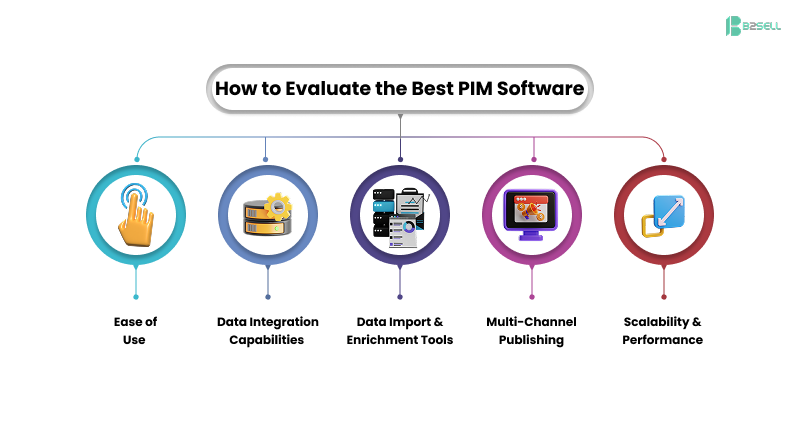
1. Ease of Use
Should be simple enough for product teams, not just IT.
2. Data Integration Capabilities
Must integrate with ERP systems (e.g., Epicor P21, SAP Business One, Sage, QuickBooks), eCommerce platforms (Magento, Shopify, BigCommerce), CRMs, and supplier feeds.
3. Data Import & Enrichment Tools
Automated attribute mapping, deduplication, and bulk updates.
4. Multi-Channel Publishing
One source of truth that connects to all sales channels.
5. Scalability & Performance
Must handle thousands to millions of SKUs without slowing down.
Top 7 Best PIM Software Solutions (2026): Features, Strengths & Ideal Use Cases
The PIM market in 2026 is more mature than ever, with platforms evolving beyond data management to support commerce workflows, customer experience, and integration automation. Below is an in-depth breakdown of the Top 7 Best PIM Software options that distributors, manufacturers, and industrial suppliers should consider.
1. B2Sell PIM
Best For: B2B distributors & manufacturers who handle large catalogs and require seamless ERP + eCommerce integration.
B2Sell PIM is purpose-built for industrial, electrical, HVAC, plumbing, hardware, automotive, and machinery distributors. Unlike generic PIM solutions, B2Sell fully aligns with how distributors operate — managing product families, spec data, compatibility charts, supplier mappings, and multi-channel catalogs.
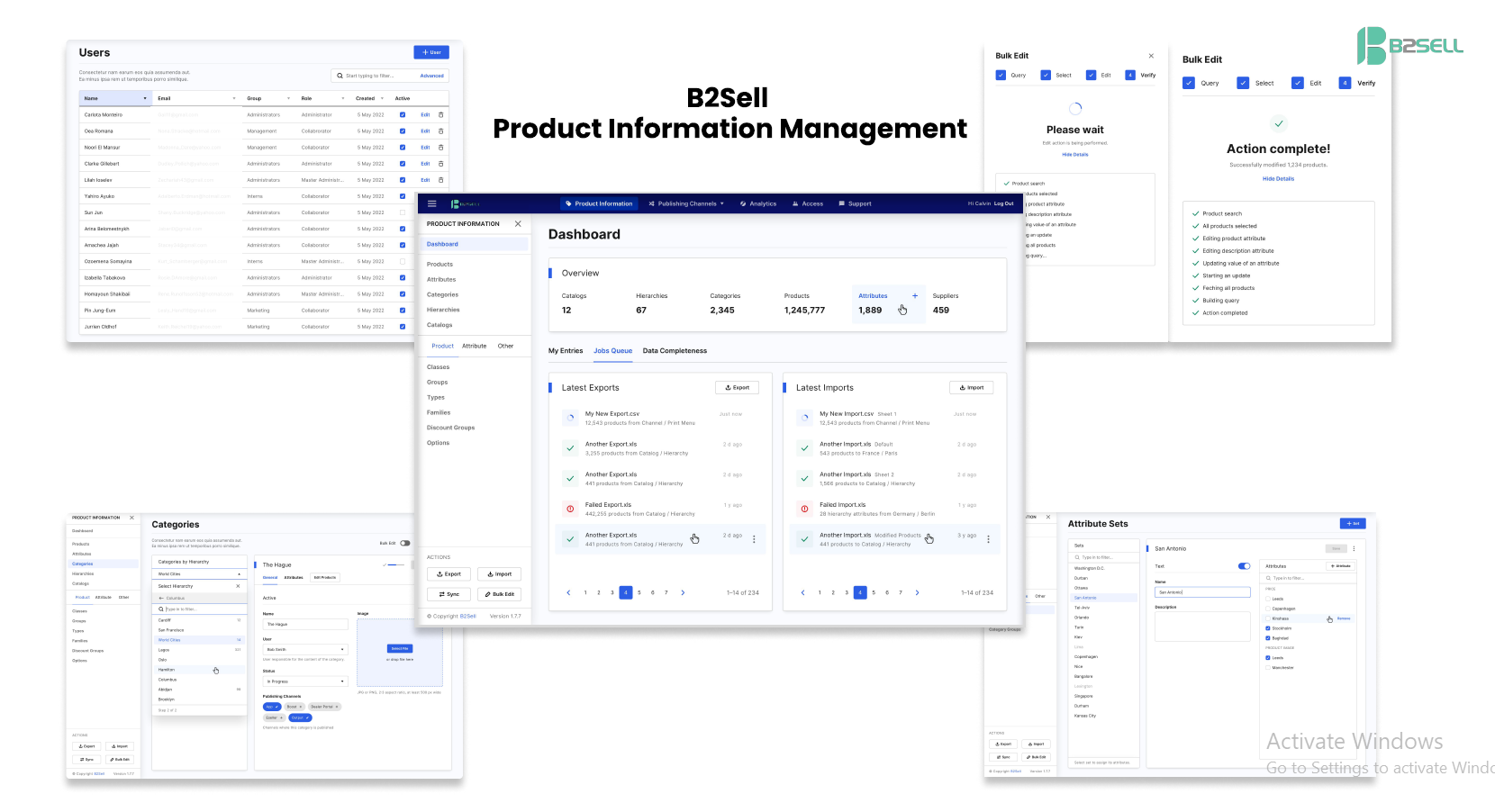
Key Capabilities
- Centralized product data repository with bulk-update controls
- Attribute-level enrichment and template-driven data quality scoring
- Built-in Digital Asset Management (DAM) for photos, diagrams, spec sheets, SDS files, manuals
- Automated sync with ERP (SAP, Epicor, Infor, Sage, QuickBooks, Prophet 21, etc.)
- Seamless publishing to B2B eCommerce, customer portals, and marketplaces
- Support for multi-language + multi-region catalogs
Why Distributors Choose B2Sell PIM
- Handles 50,000 to 1,000,000+ SKUs without performance issues
- Reduces catalog update and product launch cycles by 40–60%
- Minimizes manual data re-entry across teams
- Designed for both internal staff and dealer networks
Ideal Use Case Example
A bearings distributor managing part cross-reference data uses B2Sell PIM to automate compatibility mapping—reducing quote time by 30% and increasing repeat order accuracy.
2. Akeneo PIM
Best For: Businesses with strong product storytelling and marketing content needs.
Akeneo is popular among brand-driven organizations where product stories, lifestyle imagery, and rich merchandising content matter. It offers both open-source and enterprise versions.
Strengths
- Advanced enrichment workflows and review checkpoints
- Plug-in marketplace for integrations
- Strong multilingual catalog management
Considerations
- May require extra consulting for ERP + eCommerce alignment
- Training curve is high for non-technical users
- Best ROI when teams have structured product processes already in place
Best Fit Industries - Retail, fashion, beauty, luxury, and lifestyle brands.
3. Pimcore
Best For: Enterprises requiring PIM + CMS + DAM in one platform.
Pimcore is highly flexible and open-source, making it appealing for companies with internal development resources. It supports custom data models and complex workflows.
Strengths
- One platform for PIM, DAM, MDM, and content management
- Ideal for custom data modeling
- Scalable for enterprise-level deployments
Considerations
- Implementation requires engineering involvement
- May be excessive for mid-sized distributors wanting quick setup
- Customization increases deployment timelines
Best Fit Industries
Manufacturing, enterprise retail, supplier networks.
4. Inriver PIM
Best For: Companies selling through multiple distribution channels that require strong product storytelling and dynamic content.
Inriver helps companies push enriched product content across online marketplaces, catalogs, applications, and distributor networks while tracking product performance insights.
Strengths
- Strong syndication capabilities
- Product experience metrics and channel analytics
- Flexible workflows for marketing and merchandising teams
Considerations
- Premium pricing structure
- Requires internal process maturity to maximize ROI
Best Fit Industries
Industrial equipment, home improvement, packaged goods, automotive aftermarket.
5. Salsify (PXM)
Best For: Brands that sell heavily through retail chains and consumer marketplaces.
Salsify blends PIM with Product Experience Management (PXM), enabling brands to maintain consistent product pages across platforms like Amazon, Walmart, Lowe’s, Home Depot, and Wayfair.
Strengths
- Powerful marketplace syndication and listing optimization
- Strong digital shelf analytics
- Great for marketing-led organizations
Considerations
- Not ideal for deep technical product data
- Less focused on the needs of B2B distributors
- Pricing increases with channel scale
Best Fit Industries
Consumer brands, home goods, retail suppliers, packaged products.
6. Catsy
Best For: Businesses needing fast catalog creation (digital + print) alongside product data management.
Catsy specializes in catalog automation, making it a strong option for teams who frequently produce print or dealer catalogs. Useful for distributors that need both web and offline product collateral.
Strengths
- Easy-to-use DAM + PIM combined
- Auto-generate product pages, spec comparison tables, and data sheets
- Clear UI for non-technical users
Considerations
- Less flexible data modeling structures
- Limited enterprise-level workflow automation
Best Fit Industries
Manufacturing suppliers, industrial parts distributors, HVAC suppliers.
7. Syndigo
Best For: Enterprise organizations requiring product data governance, compliance validation, and retailer-certified content.
Syndigo focuses on ensuring product data meets industry and retailer-specific data requirements, particularly useful when compliance and accuracy are critical.
Strengths
- Deep compliance + data governance frameworks
- Large content distribution and retailer integration library
- Excellent for companies selling into regulated or standardized markets
Considerations
- Pricing aligns with enterprise budgets
- Less flexible for mid-sized distributors with evolving product models
Best Fit Industries
CPG, healthcare supplies, regulated product suppliers, multi-market retailers.
Real-World Example: Distributor Using PIM to Scale Faster
A mid-sized industrial parts distributor had:
- 60,000+ SKUs
- Slow eCommerce updates (2–6 weeks delay)
- Frequent pricing inaccuracies
- High rate of product-related support calls
After implementing B2Sell PIM:
- Product updates sync across ERP + eCommerce instantly
- New product onboarding time reduced from 10 days to 2 days
- Sales reps gained instant access to spec sheets
- Customer support tickets dropped by 35%
Result: Faster quoting, fewer mistakes, and improved customer trust.
Benefits of Implementing the Best PIM Software
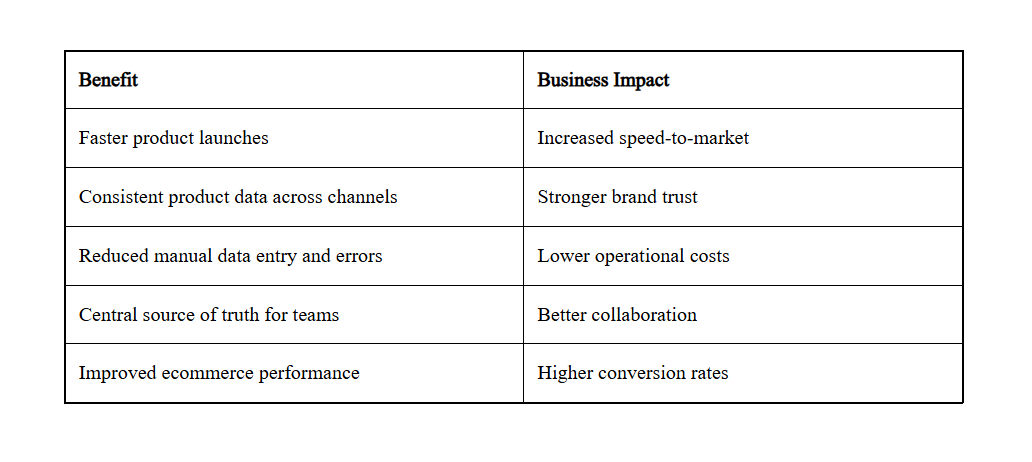
With PIM, companies can also enhance customer experience through secure self-service customer portals:
https://www.b2sell.com/customer-portal
Conclusion
Choosing the Best PIM Software in 2026 is about more than storing product data. It’s about scaling your business efficiency, reducing manual workload, and providing consistent product experiences across every sales channel.
For B2B distributors and manufacturers, the right PIM is the difference between daily data chaos and fully automated, reliable product information workflows.
Ready to Transform Your Product Data Workflow?
If your organization manages large product catalogs or sells across multiple channels, it’s time to simplify.
Book a Strategy Call with B2Sell to see how PIM can streamline your operations and boost customer experience.
👉 https://www.b2sell.com/pim

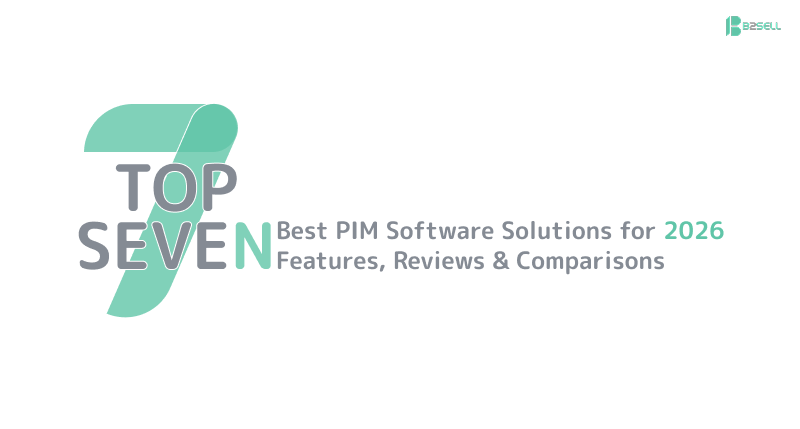

.png)
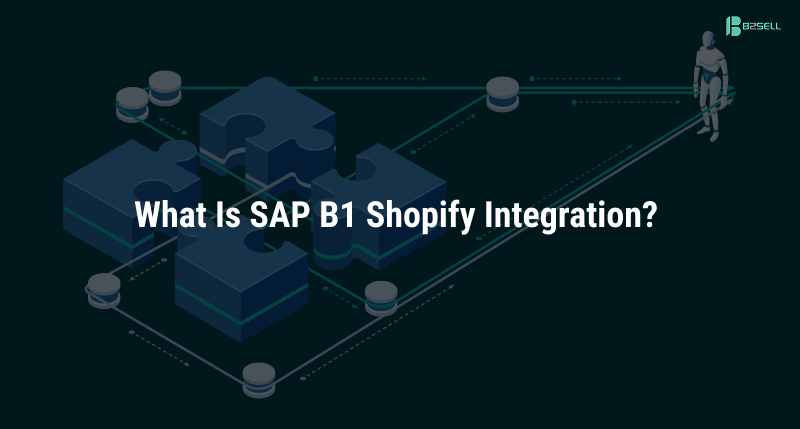


.png)